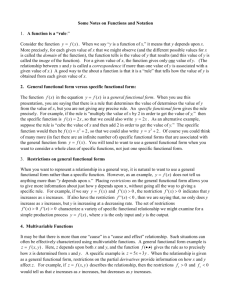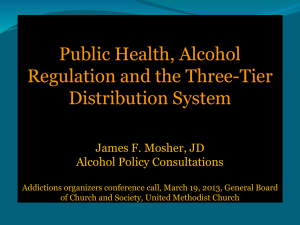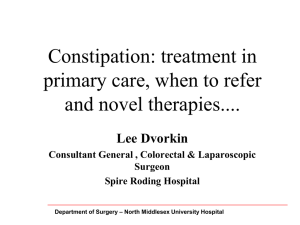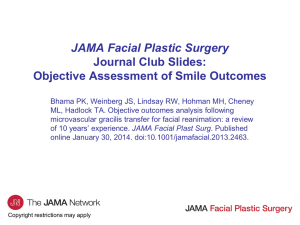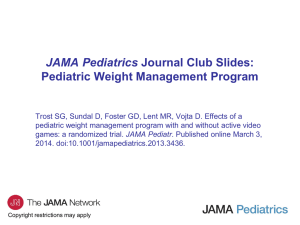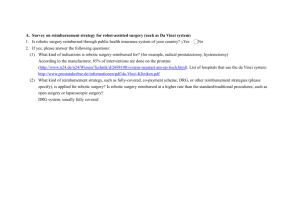Results Primary Outcome at 3 Months of Life
advertisement
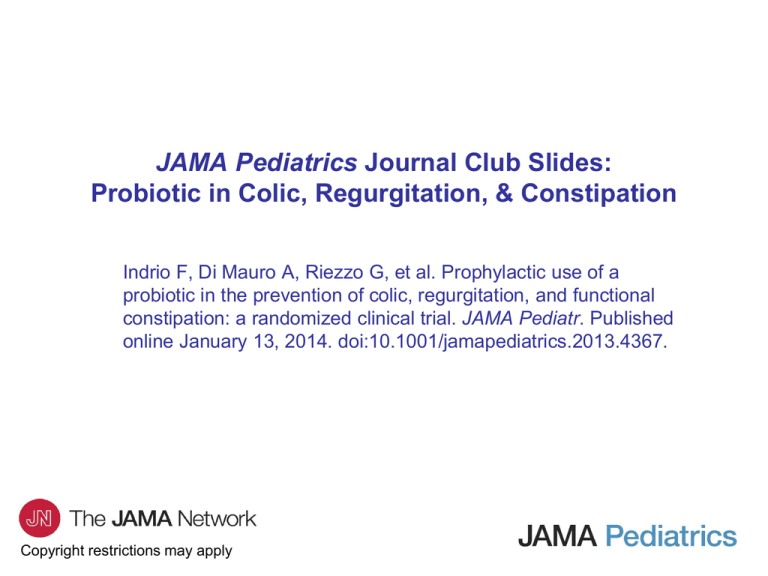
JAMA Pediatrics Journal Club Slides: Probiotic in Colic, Regurgitation, & Constipation Indrio F, Di Mauro A, Riezzo G, et al. Prophylactic use of a probiotic in the prevention of colic, regurgitation, and functional constipation: a randomized clinical trial. JAMA Pediatr. Published online January 13, 2014. doi:10.1001/jamapediatrics.2013.4367. Copyright restrictions may apply Introduction Background • Infantile colic, gastroesophageal reflux (GER), and constipation are common gastrointestinal disorders that lead to referral to a pediatrician during the first 6 months of life. • These conditions are often responsible for hospitalization, feeding changes, use of drugs, parental anxiety, and loss of parental working days with relevant health and social consequences. Study Objective • To investigate whether oral supplementation with Lactobacillus reuteri DSM 17938 during the first 3 months of life can reduce the following: – Onset of colic, GER, and constipation in term newborns. – Socioeconomic impact of these conditions. Copyright restrictions may apply Methods Study Design • Multicenter, double-blind, randomized clinical trial in 589 term newborns (age <1 week) born at 9 different neonatal units in Italy between September 1, 2010, and October 30, 2012. Setting • In a structured diary, parents recorded the number of episodes per day of: – Regurgitation. – Inconsolable crying episodes (minutes per day as already described in the literature). – Evacuations per day. • Parents also recorded number of office visits, diet changes, hospitalizations, loss of working days, and use of medications. Patients • 589 Infants were randomly allocated to receive L reuteri DSM 17938 or placebo daily for 90 days. Copyright restrictions may apply Methods Outcomes • Reduction of incidence of colic, GER, and constipation during the first 3 months of life. • Cost-benefit analysis of probiotic supplementation. Limitations • Loss to follow-up of 16.8% of children enrolled in the trial. • An unselected population was recruited, with possible risk of overtreating healthy neonates. Copyright restrictions may apply Results Primary Outcome at 1 Month of Life Copyright restrictions may apply Results Primary Outcome at 3 Months of Life Copyright restrictions may apply Results Secondary Outcome at 3 Months of Life Copyright restrictions may apply Comment • Daily administration of L reuteri DSM 17989 early in life decreased the reported incidence of inconsolable crying, regurgitation, and functional constipation in the first 3 months of life. • Supplementation was estimated to generate savings for families and society (from lower utilization of health care services). • To our knowledge, this is the first clinical trial to address the use of a probiotic to prevent gastrointestinal disorders in neonates. Copyright restrictions may apply Comment • Early life events could increase visceral sensitivity and mucosal permeability, alter the balance of the enteric microflora, and increase mucosal and neurogenic low-grade inflammation, altering the signal of the gut-brain-microbiota axis. • Driving a change of colonization during the first weeks of life through giving lactobacilli may promote an improvement in intestinal permeability, visceral sensitivity, and mast cell density. Probiotic administration may represent a viable strategy for preventing gastrointestinal conditions in infants. Copyright restrictions may apply Contact Information • If you have questions, please contact the corresponding author: – Flavia Indrio, MD, Department of Pediatrics, Aldo Moro University of Bari, Policlinico, Piazza G Cesare 11, Bari, Italy (f.indrio@neonatologia.uniba.it). Funding/Support • This study was supported by BioGaia AB, Sweden, which provided active study product and placebo. Conflict of Interest Disclosures • None reported. Copyright restrictions may apply
